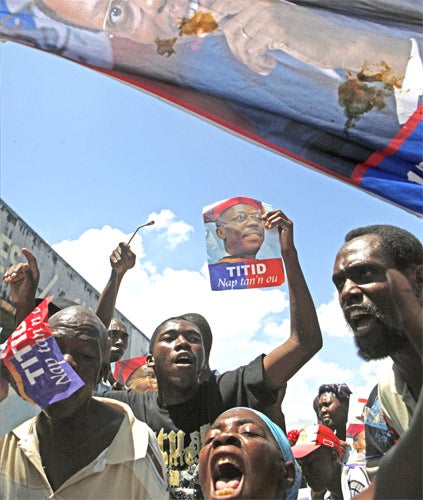Your support helps us to tell the story
From reproductive rights to climate change to Big Tech, The Independent is on the ground when the story is developing. Whether it's investigating the financials of Elon Musk's pro-Trump PAC or producing our latest documentary, 'The A Word', which shines a light on the American women fighting for reproductive rights, we know how important it is to parse out the facts from the messaging.
At such a critical moment in US history, we need reporters on the ground. Your donation allows us to keep sending journalists to speak to both sides of the story.
The Independent is trusted by Americans across the entire political spectrum. And unlike many other quality news outlets, we choose not to lock Americans out of our reporting and analysis with paywalls. We believe quality journalism should be available to everyone, paid for by those who can afford it.
Your support makes all the difference.Police were keeping watch over the Haitian capital yesterday as an uneasy calm descended on streets still littered with debris following protests by opposition groups calling for the resignation of the country's President, René Préval.
Teargas was fired outside the ruined national palace in central Port-au-Prince on Monday to disperse a crowd of up to 2,000 protesters angered by what they believe are Mr Préval's attempts to hold on to power beyond his legal term.
The President, who was much criticised in the aftermath of January's earthquake – which killed between 230,000 and 300,000 Haitians and left 1.5 million more homeless – had earlier persuaded parliament to give him an extra three months in office to help co-ordinate ongoing relief efforts.
Opposition groups, including supporters of Haiti's exiled former leader, Jean-Bertrand Aristide, believe, however, that he is using the emergency as a pretext to illegally extend his rule.
Elections were supposed to be held in February but will now be delayed. Some fear they could eventually be cancelled. "He is profiting from this disaster in order to stay in power," said Herve Santilus, a demonstrator interviewed by the Associated Press.
He, like hundreds of thousands of other restless citizens, has been unemployed and relying on aid handouts since the disaster struck.
Another protester, Claudy Louis, told reporters: "Preval has used the drama that our country went through and turned it into an opportunity for himself. Instead of looking out for the people, he quickly hatched a plan to benefit the small group of people around him."
An angry crowd ran through the city on Monday afternoon, chanting slogans and holding posters of Mr Aristide. They were dispersed with teargas after breaking through security barricades around the palace, where Mr Préval was meeting political allies.
Some protesters threw rocks at passing United Nations vehicles. Others were seen attacking passers-by, taking money, jewellery and mobile telephones. "They came up to me and one of them pulled a gun and told me 'Give me everything you have on you'," 21-year-old Jerome Berlanger told Reuters news agency, in tears with his clothes torn to rags.
Video footage of the clashes suggested that a few members of the crowd were carrying firearms.
In parts of the city, the crowd met counter-demonstrators who threw rocks, and, in an isolated incident in the city's Bel Air neighbourhood, someone fired a shotgun from a ruined building. One protester was treated for wounds from that attack.
Mr Préval has now promised to leave office no later than May 2011, five years after he was sworn in.
He says the extension to his term is necessary to allow officials time to properly organise a new election, since Haiti's voter records were destroyed, along with the building that housed its election agency, in January's earthquake.
Though Mr Préval is a relatively benign leader – at least by Haitian standards – he was widely accused of incompetence in the aftermath of the disaster, when his administration appeared to go missing without trace.
Critics say his absence hampered an already-fraught relief effort, leading to tens of thousands of extra deaths. Earlier in his term, the President had also faced criticism for being over-friendly with the Bush administration, and agreeing to abolish trade tariffs.
The US promptly flooded Haiti with cheap rice, bankrupting many farmers and forcing hundreds of thousands of citizens to migrate to major cities in search of work. Haiti's constitution forbids presidents from serving two consecutive terms, so when an election does happen, it may set the stage for the return of the former leader, Mr Aristide, who had a more robust policy towards Washington but who was exiled to Africa following a US-sponsored coup in 2004.

Join our commenting forum
Join thought-provoking conversations, follow other Independent readers and see their replies
Comments